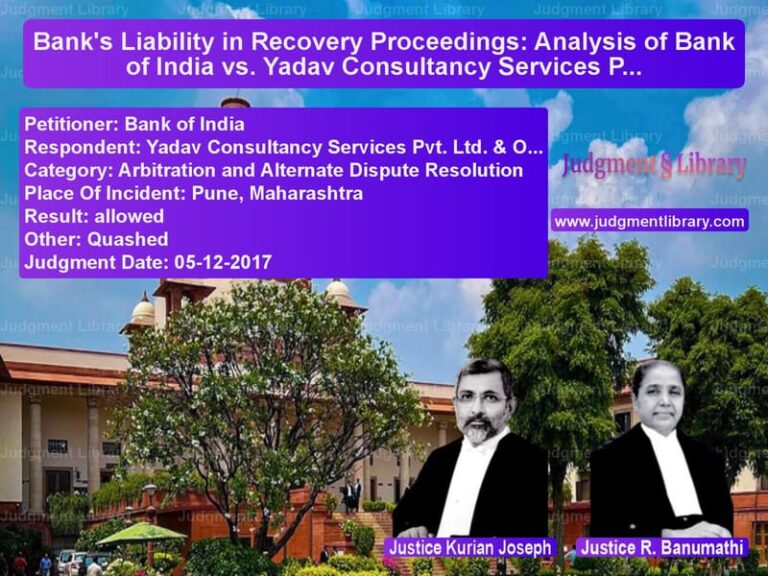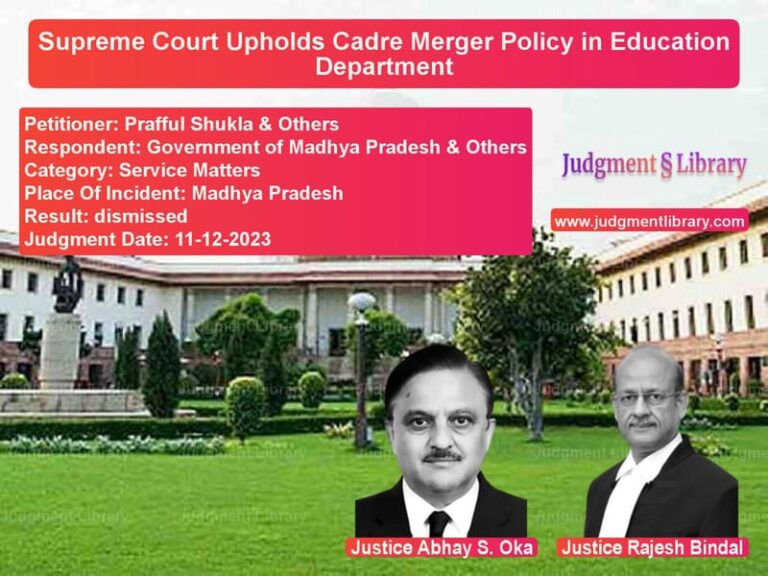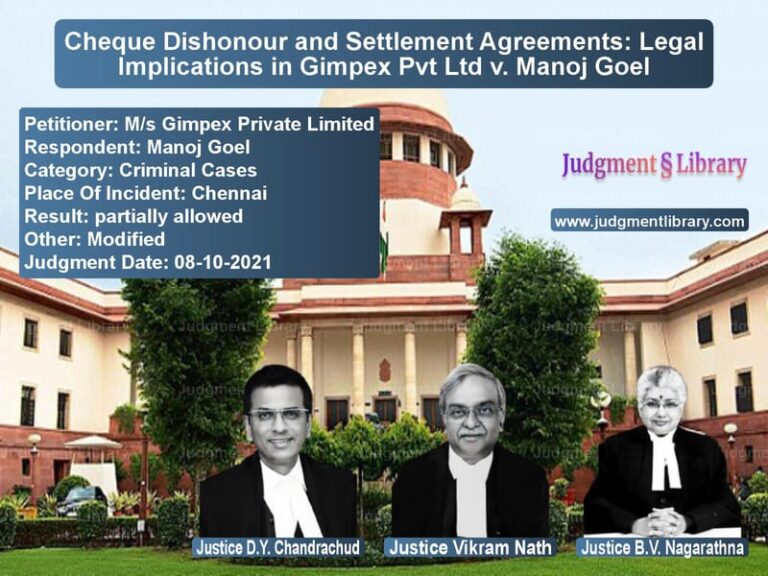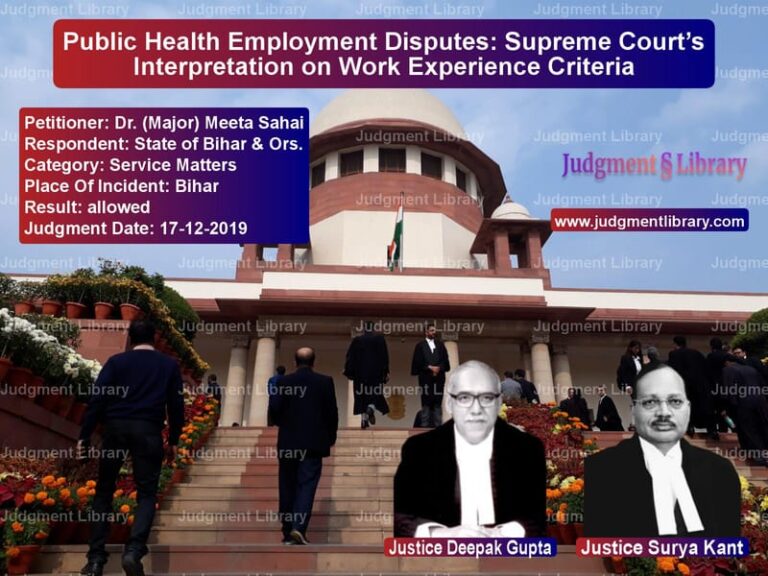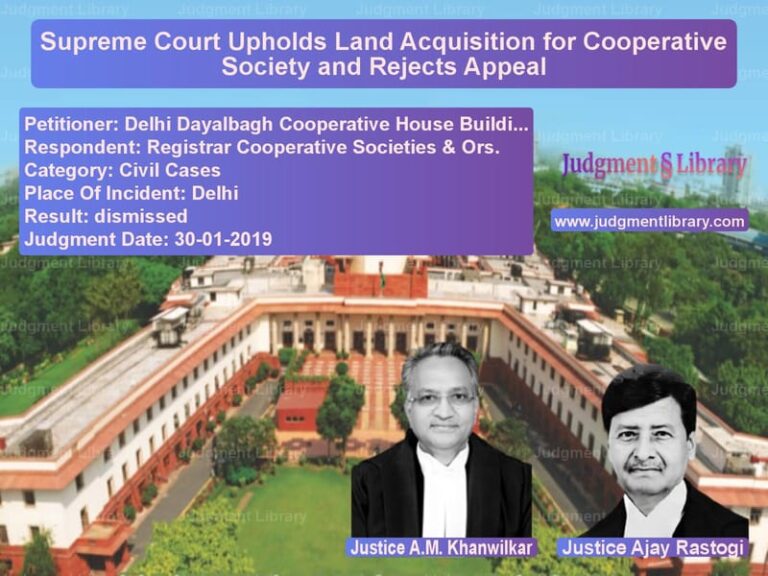Supreme Court Strikes Down Action Based on Repealed Import Control Order
The case of Union of India & Others v. T.R. Mehra & Others revolved around the legal validity of actions taken based on a quasi-judicial order issued under a repealed law. The Supreme Court was called upon to decide whether an order passed under the Imports (Control) Order, 1986, which was rendered ineffective following the enactment of the Foreign Trade (Development and Regulation) Act, 1992, could still serve as the basis for legal action.
The Court ruled in favor of the respondents, holding that once a statute and its associated orders are repealed, any quasi-judicial order derived from them ceases to have legal force unless explicitly saved by a savings clause. The judgment reinforced the principle that legal action cannot be based on repealed statutes unless expressly permitted by law.
Background of the Case
The dispute arose when the Union of India took action against T.R. Mehra and other respondents based on an order dated November 14, 1986, issued under the Imports (Control) Order, 1986. The order restricted the import of certain goods.
Key facts of the case:
- The Imports (Control) Order, 1986, was issued under the Imports and Exports (Control) Act, 1947.
- The Foreign Trade (Development and Regulation) Act, 1992, repealed the 1947 Act and replaced the old import control regime with a more open trade policy.
- The respondents imported goods in August 1997, by which time the 1992 Act had come into force.
- The appellants (Union of India) sought to penalize the respondents for violating the 1986 import restrictions, relying on the 1986 order.
The key legal issue was whether the action against the respondents could be justified based on an order passed under a repealed law.
Arguments by the Appellants (Union of India)
The government contended that:
- The 1986 order remained valid despite the repeal of the 1947 Act.
- Under Section 20 of the 1992 Act, certain rights and liabilities under the repealed law were saved.
- The import of goods by the respondents should be examined in light of the prior restrictions.
- Legal continuity should be maintained to uphold past regulatory actions.
Arguments by the Respondents (T.R. Mehra & Others)
The respondents countered with the following points:
- The 1992 Act liberalized imports and made the import of the stated goods lawful.
- The 1986 order was repealed and no longer had any legal effect.
- The government’s action was based on a dead law and could not be legally enforced.
- Section 20 of the 1992 Act did not explicitly save the quasi-judicial orders passed under the repealed Import Control Order.
Key Observations by the Supreme Court
The Supreme Court found the government’s argument unsustainable and made the following key observations:
- Effect of Repeal: Once the Imports and Exports (Control) Act, 1947, was repealed, any statutory orders under it, including the 1986 import control order, ceased to have legal effect.
- Legislative Intent: The 1992 Act was meant to liberalize imports, and allowing an old restriction to persist would defeat the legislative intent.
- No Savings Clause for Quasi-Judicial Orders: The Court examined Section 20(2) of the 1992 Act, which preserved penalties and legal proceedings under the repealed Act but found that it did not explicitly save quasi-judicial orders from the past.
- Repugnancy to the 1992 Act: The government’s reliance on the 1986 order was directly opposed to the open trade policy introduced by the 1992 Act.
Supreme Court’s Judgment
The Supreme Court ruled against the government, stating:
“A quasi-judicial order passed in exercise of powers under the Statutory Order which stands repealed along with the repealed Act is not saved, especially when it will be per se repugnant to the 1992 Act and defeat the spirit of opening of the import regime for the stated goods.”
The Court concluded that the government’s attempt to enforce an outdated restriction was unlawful and dismissed the appeal.
Implications of the Judgment
This ruling has significant implications:
- Prevention of legal actions based on repealed laws: Governments and authorities cannot enforce restrictions under laws that have been repealed.
- Emphasis on legislative intent: If a new law fundamentally changes an old regulatory regime, authorities must align their actions with the new law.
- Protection for businesses: Importers and traders benefit from legal certainty when engaging in trade under new laws.
- Ensuring judicial scrutiny of administrative actions: Courts can strike down government actions that contradict current legal frameworks.
Conclusion
The Supreme Court’s decision in Union of India & Others v. T.R. Mehra & Others reinforces the principle that legal actions must be based on current, valid laws. The ruling prevents the misuse of old regulations to impose penalties in a new legal framework. By striking down the government’s reliance on the repealed Import Control Order, the Court upheld the spirit of economic liberalization and trade fairness.
This judgment serves as a precedent for future cases involving the interpretation of savings clauses in repealed legislation, ensuring that businesses are not unfairly penalized based on obsolete regulations.
Petitioner Name: Union of India & Others.Respondent Name: T.R. Mehra & Others.Judgment By: Justice A.M. Khanwilkar, Justice Dinesh Maheshwari.Place Of Incident: India.Judgment Date: 21-08-2019.
Don’t miss out on the full details! Download the complete judgment in PDF format below and gain valuable insights instantly!
Download Judgment: Union of India & Oth vs T.R. Mehra & Others Supreme Court of India Judgment Dated 21-08-2019.pdf
Direct Downlaod Judgment: Direct downlaod this Judgment
See all petitions in unfair trade practices
See all petitions in Corporate Compliance
See all petitions in Bankruptcy and Insolvency
See all petitions in Judgment by A M Khanwilkar
See all petitions in Judgment by Dinesh Maheshwari
See all petitions in dismissed
See all petitions in supreme court of India judgments August 2019
See all petitions in 2019 judgments
See all posts in Corporate and Commercial Cases Category
See all allowed petitions in Corporate and Commercial Cases Category
See all Dismissed petitions in Corporate and Commercial Cases Category
See all partially allowed petitions in Corporate and Commercial Cases Category


